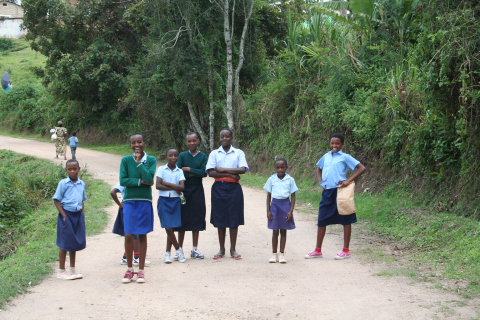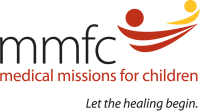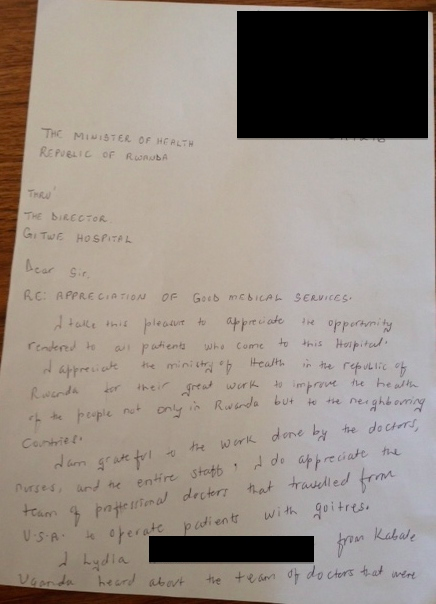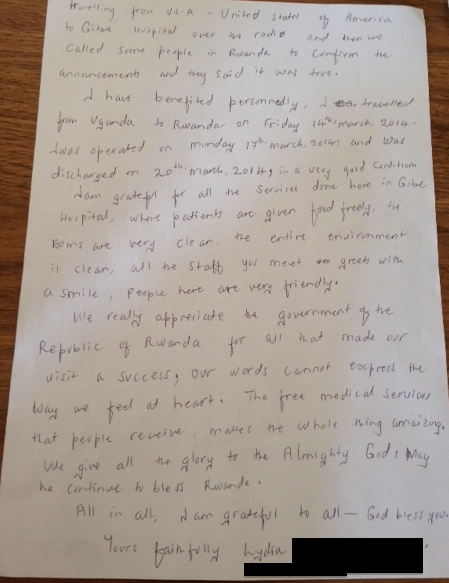Paul Christian Barrera is a writer and editor based in Oakland, California, currently at work on his first collection of prose. His creative work has been selected for publication by the conservation blog Nature Bats Last. He is employed as a Course Writer and Editor at Academy of Art University in San Francisco, working with instructors and professors to develop web-based learning modules targeted at the school’s large population of foreign and overseas students. He graduated from the University of California, Riverside with a B.A. in English Composition in 2008. The 2014 MMFC mission to Rwanda is Paul’s first trip with Medical Missions for Children.
Screening Day
Saturday March 15, 2014
Patients queued outside the Medical Mission for Children team’s makeshift office in the late afternoon, seeking evaluation and treatment for their thyroid conditions. Rain clouds filled the sky and began to shower just as screening began. Many patients were local, from Gitwe and other nearby communities, but others journeyed several hours by foot, car, and motorcycle taxi to Hôpital Gitwe, with some persons traveling from as far away as Uganda.
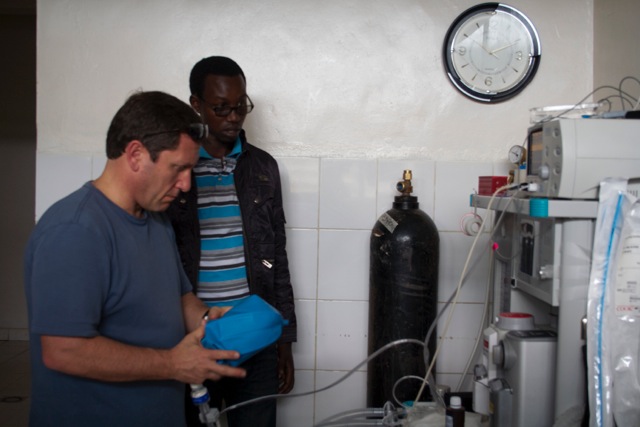

Despite their difficult voyages, the patients’ high spirits and hopefulness were as refreshing as the day’s early evening rain, energizing an MMFC team that had spent the last three days traveling from the States to Amsterdam to the Rwandan capital Kigali before finally reaching the mission site at Gitwe.
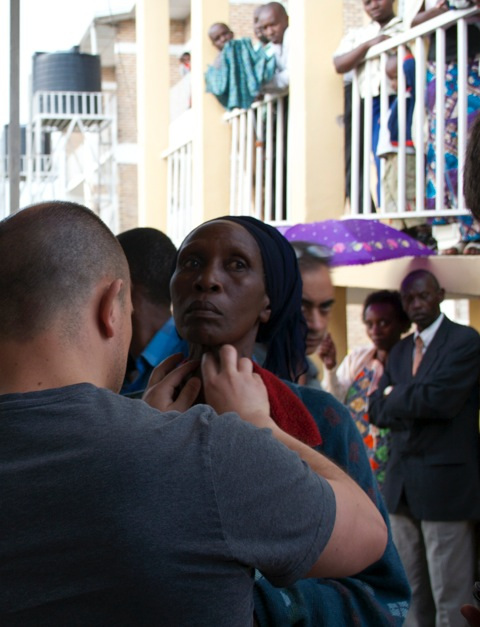
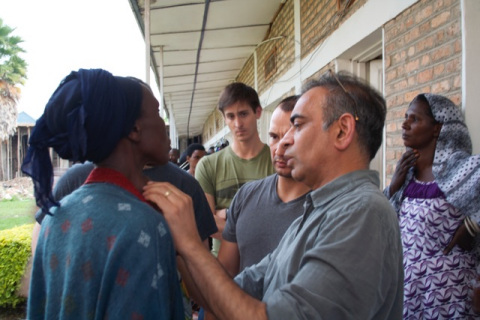
After setting up their equipment and settling into their accommodations for the week, several members of the team joined the local children in a game of pickup football that attracted more and more smiling, curious kids as the game progressed down the road, back toward Hôpital Gitwe. Many of the children had trailed the team since their mid-morning arrival in Gitwe, sharing their beautiful smiles and offering lessons in Kinyarwanda, teaching the team basic phrases like “muraho” (hello), “amakuru” (how are you?), and “meza” (I’m fine, thank you). Inspired by the gregariousness of the Gitwe community and its wonderful youth, the team screened more than 32 patients and scheduled 27 surgeries for the first four days of the mission, with more openings planned as the week progresses.
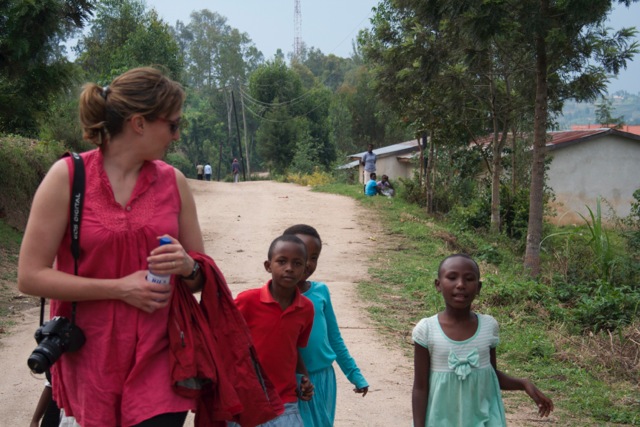
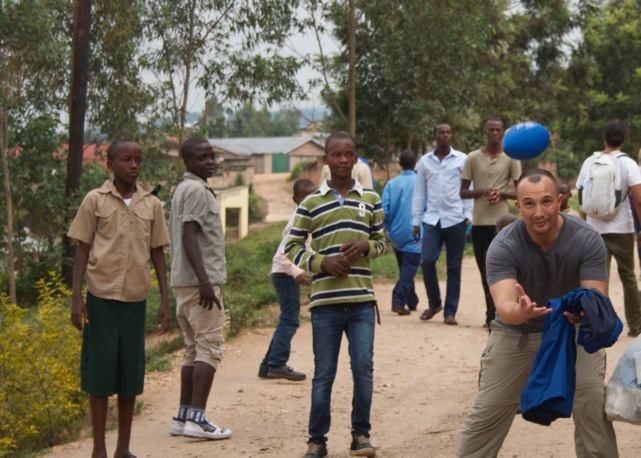
Surgery Day One
Sunday March 16, 2014
MMFC’s first day of surgeries began with foggy skies and dark clouds that threatened a second consecutive day of showers, with Sunday’s work slated to begin at 7:15 a.m. Just 90 minutes later, the day’s first operation was completed. The once-ominous rain clouds gave way to Rwanda’s unrivaled sunshine, and the local Gitwe community woke to its daily routine of conversation, travel, and hard-scrabble work.
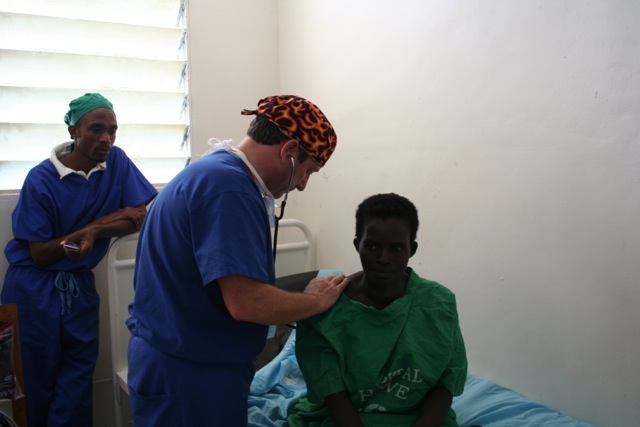
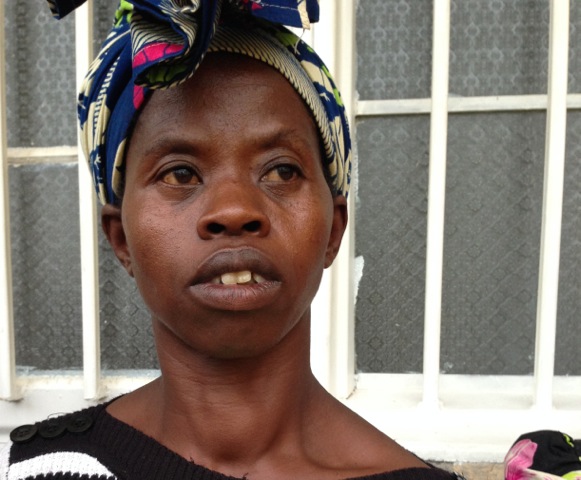
Six surgeries were scheduled for Sunday, a majority of which were the most severe cases of goiter that the MMFC surgery team planned to treat during their mission. These cases were tabbed for the beginning of the week’s work in order to allow patients maximum recovery time and ensure their comfort. In spite of the challenges of performing surgery with just a single operating room, the team’s work is best described as both organized and efficient, rotating patients in and out of the OR and dynamically adjusting their workflow to counter unforeseen obstacles in unfamiliar surroundings.
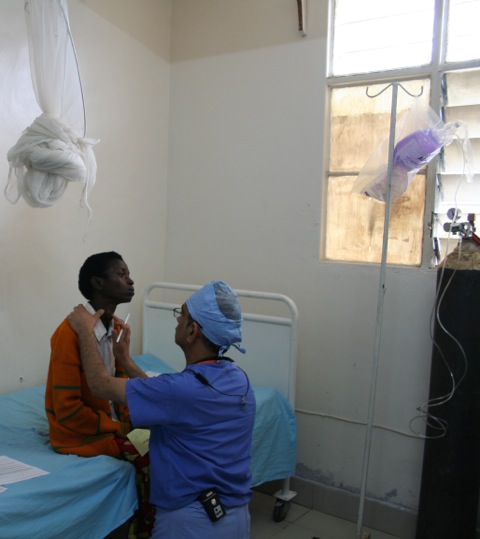
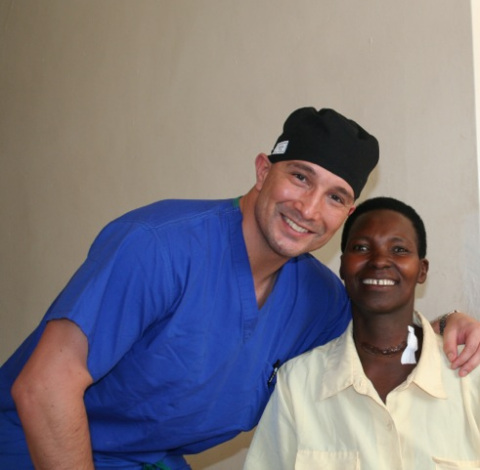
Between cases, doctors also took time out of their breaks to consult with a handful of non-thyroid cases. A specifically touching instance: a young local girl from just down the street in Gitwe, with beautiful orange-brown hair and a soft smile, gently padded into the MMFC office, backlit by the early morning sun. Her shy, discreet demeanor did little to mask her immense courage and admirable frankness, as she quietly pulled down the neckline of her crisp maroon tanktop to reveal an enormous butterfly-shaped burn across her sternum, just below her clavicles. The staff immediately set down their morning coffee and directed their attention to the girl, concluding that the burn likely occurred during infancy and thus had afflicted the girl for the duration of her life. Due to the difficult nature of her condition, the doctors directed her to a trusted plastic surgeon, making room even during their down time to offer their services to this brave young lady and those like her. This case is just one example of the compassion and gentleness that MMFC hopes to spread with their mission in Rwanda.
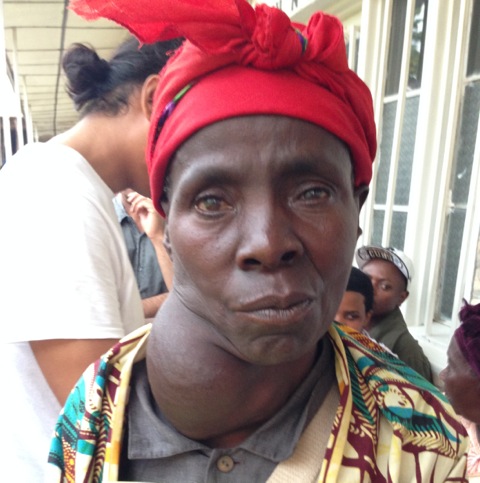
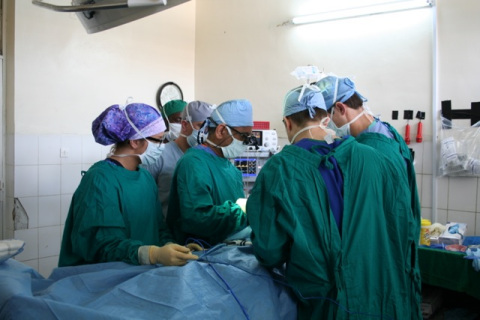
It is the team’s sincere hope that their efforts—both in and out of the OR at Hôpital Gitwe—will enable each patient to lead a more active, enriching life and enjoy Rwanda’s immense beauty and warmth, despite some of the country’s more difficult realities. Indeed, it is this sort of consideration and concern that, in the face of fatigue, has fueled the team’s efforts to assist a staggering turnout of afflicted patients seeking aid. Certainly, MMFC’s near-incessant work since their arrival on Saturday morning has proved taxing and strenuous, but their desire to help each person that crosses their path is palpable in the gratitude and relief smiled by the patients and their loved ones.
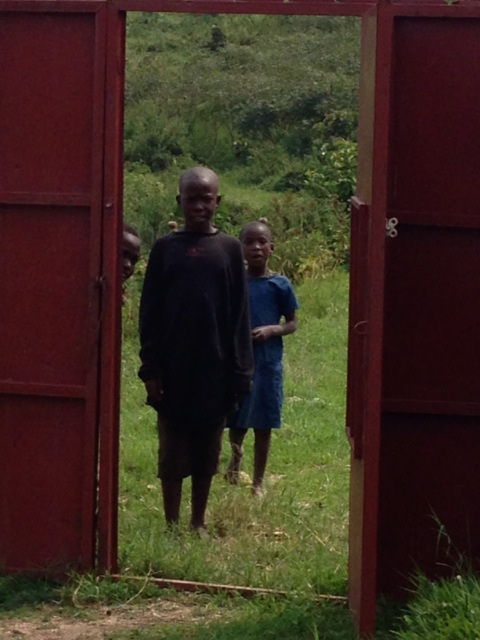
Surgery Day Two
Monday March 17, 2014
With Sunday’s surgeries under their belts, the members of MMFC’s Rwanda mission entered their second day of operating with six patients scheduled for treatment of goiter. Monday’s weather was marked by bright heat and near-cloudless skies. During the morning walk to the hospital, the team encountered a young boy driving a team of cows back toward his family’s homestead. In town, schoolchildren filled Gitwe’s main road in navy blue and sea green uniforms, holding hands as they made their way to the local academies for daily instruction. Meanwhile, the patients slated for Monday’s operations began filing into Hôpital Gitwe as MMFC’s surgery team scrubbed in, wearing lucky green caps and undershirts to celebrate St. Patrick’s Day.
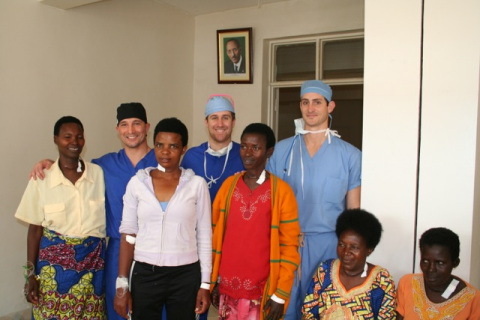
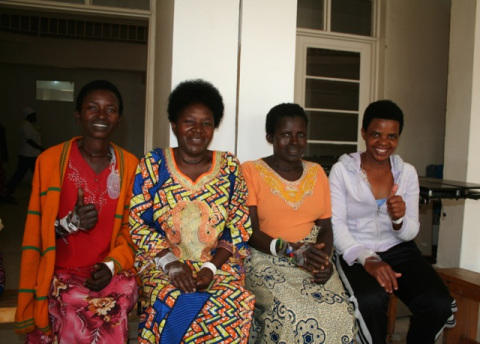
The first two cases of the day resulted in the removal of a 10 cm goiter and a 35 cm goiter, respectively. These cases represented some of the team’s largest goiter removals of the week, and were thus planned for early in the day to give each patient ample time to recover and rest before their long journeys home. The patients, still groggy from anesthesia, nonetheless expressed immense gratitude to the team. Their huge smiles belied each woman’s desire to return home and begin their new lives without the pain and disfigurement caused by their thyroid conditions.
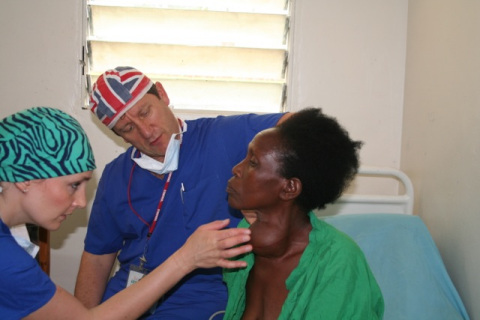
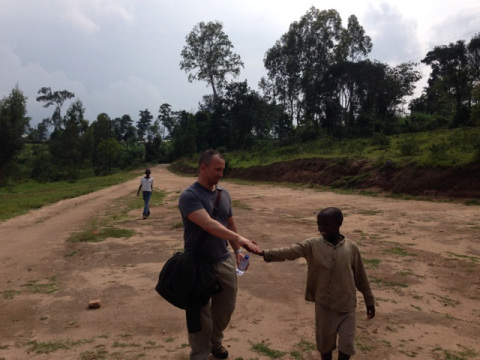
Rwanda is known as “the land of a thousand hillsides and a million smiles,” and this sense of community and cooperation has been unmistakable since the team arrived in Gitwe. The day’s schedule originally included one of the few male patients to visit Hôpital Gitwe for thyroid surgery, a gentle, unassuming man named Evaliste who hails from Gitwe. However, the team became aware of a woman named Lydia, who had driven four hours from Kabale, Uganda with her cousins to seek surgery from the MMFC team. One of the original 32 patients screened on Saturday evening, Lydia was slated to receive her surgery on Thursday, for which she expressed deep gratitude. But she also indicated that she needed to be back in Uganda no later than Saturday morning in order to make it to her job as a social worker. Wanting to ensure an on-time recovery for Lydia, the team consulted with Evaliste, who was gracious enough to switch his spot on Monday’s schedule for Lydia’s original time slot on Thursday morning. Both were satisfied with the outcome, and Evaliste seemed especially pleased that he was able to help a fellow patient. With this sort of friendly, flexible collaboration from the patients, the MMFC team has had no trouble adjusting their workload to accommodate each person’s special needs and limited travel schedules.
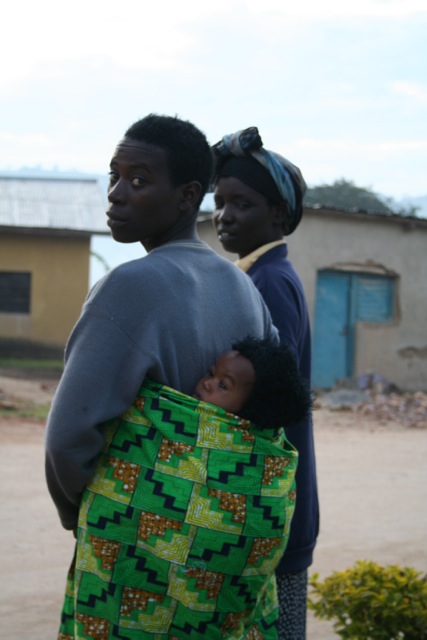
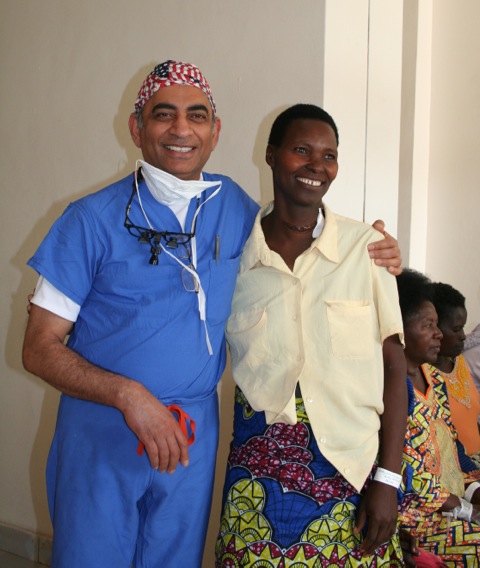
Dr. Stephanie Jones Returns Home
March 18, 2014
MMFC’s thyroid mission to Gitwe was launched in 2006 through the tremendous joint efforts of Rwanda native Vianney Ruhumuliza and Dr. Denny Snyder, with the goal of spreading aid and benevolence via top-class medical treatment and gentle goodwill. Understandably, Vianney was deeply moved by what he describes as “the trouble” that tore through his homeland in 1994. He had since envisioned a program like MMFC’s mission to Rwanda; in his words, he wished to “give thanks for the gift of life” in response to the atrocities visited upon his countrymen.
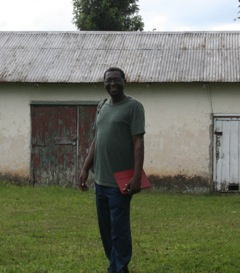
Fortuitously, Vianney and Dr. Snyder met during Vianney’s tenure as a travel nurse at Brockton Hospital in Boston in 2003. Linked by their humanitarian goals, Denny and Vianney began developing the plan for an aid-based mission to Vianney’s homeland. Three years later, after much struggle and red tape, Denny and Vianney organized the first thyroid mission to Gitwe. It is a mission that continues to this day, with yearly trips for brave and kind-hearted doctors wishing to share their skills with the rest of the world.
Denny and Vianney’s fight to create this mission is the lynchpin to a most incredible coincidence that occurred during this year’s mission, in which a descendant of a native Rwandese man was able to return to the land of her ancestors on a mission of peace and aid.
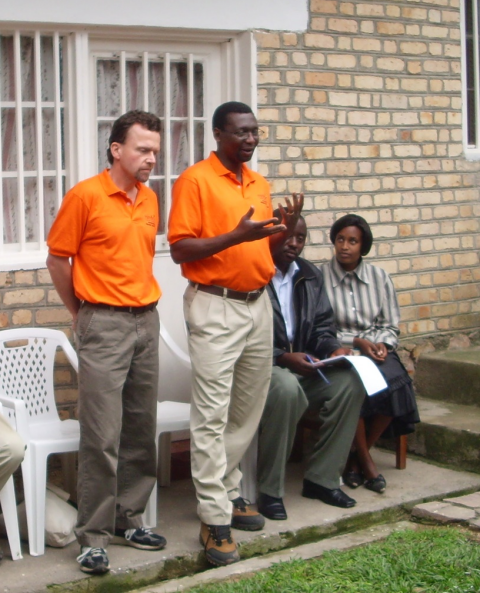
Meanwhile in 2006, as Vianney and Denny embarked on the first-ever MMFC mission to Gitwe, a young anesthesiologist named Stephanie Jones was beginning her career in medicine at Loma Linda University—a fourth-generation physician, and the first woman in her family to hold the title.
Stephanie’s history of medical aid in Africa, however, began long before this year’s mission to Gitwe. It is a story that stretches into pre-War Rwanda, encompassing three generations of Stephanie’s family: a story that fits hand-in-glove with Vianney Ruhumuliza’s own history of travel medicine.
Robert Llewelyn Jones and his wife Charlotte were missionaries for the Seventh-Day Adventist Church, and in the late 1920s began a religious mission in Gitwe, a small rural village south of the Rwandese capital of Kigali City.
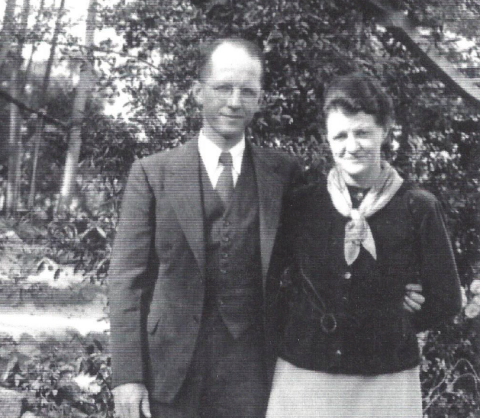
In 1931, Donald Jones was born to Charlotte and Robert in nearby Ngoma, the only appropriately equipped hospital in the area at the time. Donald, a precocious and sharp-minded youth, attended La College Adventiste de Gitwe, just steps from the current Hôpital Gitwe site—the same place where Donald’s third grandchild, Stephanie Jones, would work on her first medical mission more than 70 years later.
“When I first signed up for the trip, I didn’t make the connection. But after talking to Dr. Jeremy Collins, leader of the Gitwe anesthesia team, and looking at his photos from previous missions, I started to put the pieces together,” Stephanie said. “To be able to come back to where my lineage began, in the capacity of a medical mission, it’s very powerful for me.”
Robert and Charlotte were cornerstones of the community in Gitwe. Robert was the regional secretary for the Seventh-day Adventist church and a teacher at the local primary school. They were leaders of the local faith community, and their five children were regular playmates of the native kids.
In 1940, as World War II raged across Europe and the African continent, Robert was approached via letter by a Belgian mission in the Congo, which asked him to stand in for the local missionaries during a planned absence. Robert graciously agreed and set off for the Congo, leaving his wife and young children behind to look over the family’s work in Gitwe.
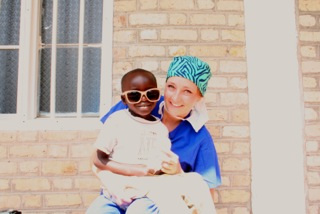
Upon his arrival in the Congo, a Belgian merchant came into the mission and reported that he’d just shot and wounded a Cape Buffalo.
“These animals are very dangerous. They will attack if wounded, and have a reputation for waiting in the bush to kill their attackers, or the next innocent humans that wander along,” Stephanie said.
The Belgian asked Robert for assistance in tracking and killing the buffalo before it harmed anyone else.
“Bwana Jones, don’t go,” the natives told him. “These animals are dangerous, and will kill someone,”
A skilled hunter and marksman, their warnings only served to fuel Robert’s sense of duty. He thus undertook a hunting expedition with a small party comprised of the Belgian merchant and some local natives from the Congo. The party found the track of the Cape Buffalo and followed it most of the day, until they lost the trail early in the afternoon. Determined to quell the threat for good, Robert and his team set up camp, hoping to starve out their quarry and line up a finishing shot.
“They sat down in a clearing under a tree to eat their lunch and nap. While standing in the clearing, the buffalo appeared and charged my great-grandfather and knocked him to the ground. He held the beast by the horns while it pushed him around in the dirt until the others finally shot the buffalo,” Stephanie said.
“He was taken to a primitive field hospital nearby with broken ribs and severe internal organ damage. He died two days later complaining of horrible abdominal pain.”
Two weeks after the incident, in the middle of the night, Charlotte received correspondence from the Congo, informing her that Robert, the father of her five children, was dead.
“She cried all night. My grandpa, Don, was eight or nine,” Stephanie said. “He remembers asking her what was wrong, and that she kept telling him that she couldn’t yet say. Two days later, she sat down with her children and told them their father was dead. And that they were returning to America.”
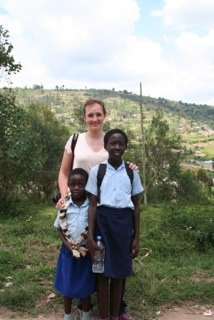
The Jones family’s return path to the states would be far from a tranquil homecoming. Leaving behind the mission she’d built with her husband, Charlotte booked a steamer trip from South Africa to Brazil, despite the constant threat of Nazi submarines.
“They were told by the captain that no lights were allowed at night,” Stephanie said. “They had to dodge U-Boats all the way across the Atlantic until they got to Brazil.”
Bravely, Charlotte and her entire brood arrived unscathed via train, settling in the northern California community of Angwin, where Stephanie’s father, Steve, was born.
Steve would preserve his family’s proud legacy of aid, embarking on a mission to Burundi in the late 70s. His father, Don, would make the trek back to his native Africa to meet his son, and together they returned to Gitwe, the place of Don’s childhood—continuing the family’s legacy of service that Stephanie proudly carries on as part of the 2014 MMFC thyroid mission to Rwanda.
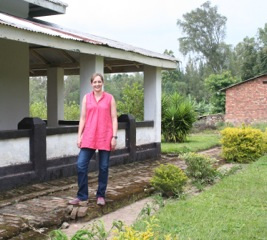
Dr. Stephanie Jones outside of her family’s original home in Gitwe. 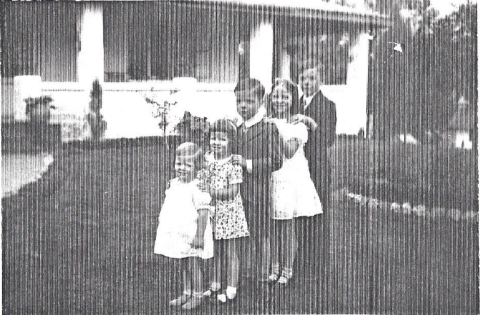
The Jones children pose in front of their house. Note the location of the outhouse on the right side of the photograph.
“To walk the same streets, to see my great-grandfather’s school, it’s a surreal feeling to represent my family and help the same families that my great-grandfather helped,” Stephanie said. “To connect so directly to my personal past while having a real role to fulfill, after all my studies, it just makes me feel like I have something meaningful to do, and that all this hard work has paid off.”
MMFC’s Goodwill in Gitwe
March 19, 2014
MMFC’s thyroid mission to Gitwe, Rwanda is a complex global health project that requires the cooperation and charity of both skilled physicians and generous benefactors. The Rwanda mission in particular is a bi-coastal effort, assembling surgical and anesthesia teams from such reputable medical centers as Tufts and Stanford. Through the efforts of the MMFC thyroid team, Rwandese men, women, and children receive highly specialized surgical services with a specific focus on excision of large goiters.
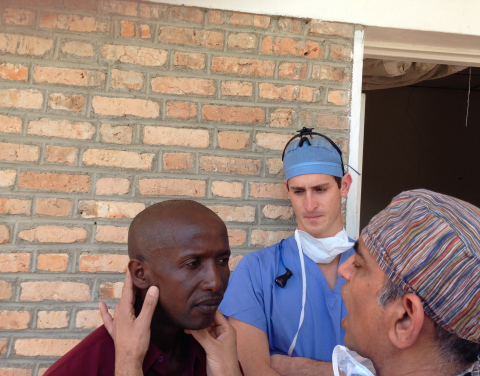
The mission is also an opportunity for young residents and medical students to develop critical operating room techniques and instincts, all within the context of donated care and medical philanthropy. Designed as an enriching experience for both the locals as well as the mission team, it comprises the tireless efforts of a multi-faceted set of professionals that includes doctors, nurses, business specialists, and writers, all of whom volunteer their services with the goal of enhancing the lives of patients that might otherwise never receive quality treatment.
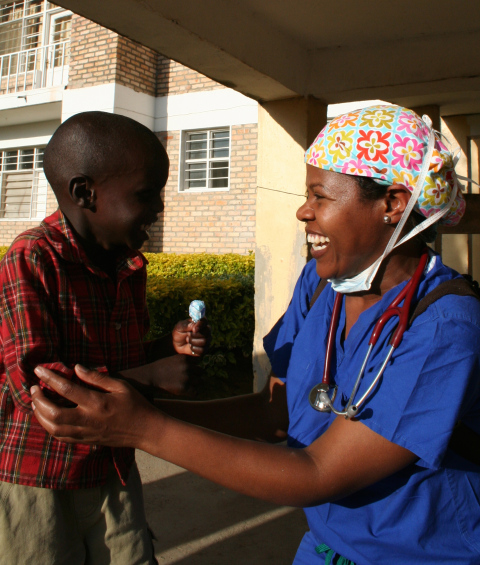
“The mission has come a long way since it began in 2006,” said Otolaryngological Surgeon Dr. Jagdish Dhingra. “The conditions under which we operate are a big challenge, but as the mission has evolved, we have been able to take on more and more challenging cases.”
Dr. Dhingra is a veteran of the MMFC thyroid mission, having made seven trips to Gitwe since the inception of the program. He and his team have helped countless goiter-afflicted Rwandese lead more active, happy, and social lives as a direct result of his surgical expertise. In turn, each resident and medical student that has accompanied Dr. Dhingra has walked away from the Gitwe experience with the deep satisfaction that can only come from sharing one’s gifts with the developing world.
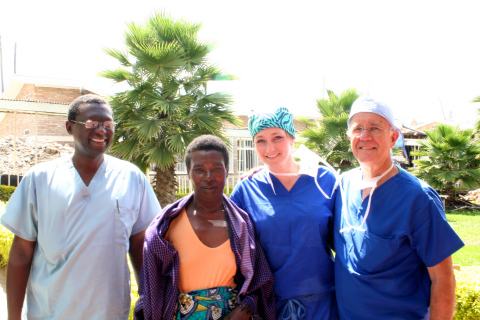
This mission would not be possible without the philanthropy of multiple donors, especially major contributions by the Downs Family and the Aiyer Family. Ethicon Endosurgery has also been a wonderful partner to MMFC, donating crucial operating equipment and implements to ensure the consistently high level of quality surgery that has defined the Gitwe mission since its inception nearly a decade ago.
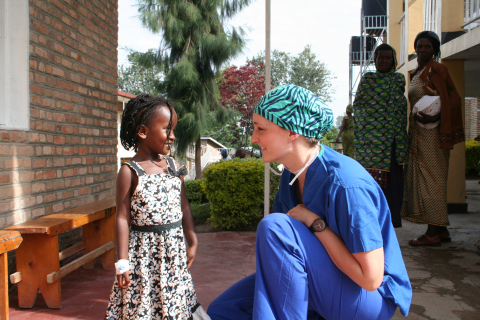
Thanks to the kind efforts of the donors, Tufts resident Jeremiah Tracey was able to join the ranks of the Gitwe team, contributing his skills and experience to what’s proven to be a most impactful medical mission, aiding the continued recovery of post-genocide Rwanda. Also joining the east coast team was third-year Weill Cornell medical student Andrew Gregg.
“It’s been an incredible opportunity to learn,” said Andrew Gregg. “I’ve had a lot of fun with the patients and the surgical team, but the biggest highlight for me is working alongside my father, Dr. David Gregg, with the specific aim of helping the less fortunate.”
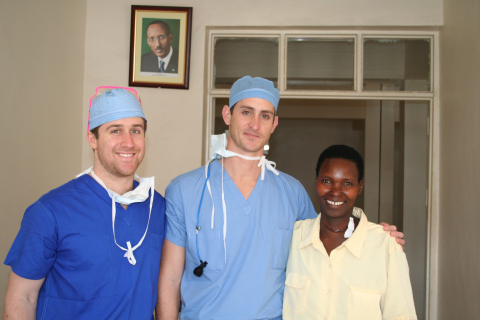
Meanwhile, the west coast contingent of the MMFC thyroid team—led by Dr. Jeremy Collins and Dr. Kevin Malott of Stanford’s Anesthesia department, as well as General Surgeon Dr. David Gregg—also received tremendous gifts from several donors. Significant among these contributions were the Hellman Family Foundation’s grants, which supported the team’s procurement of essential operating equipment and other resources . Another, anonymous donation, directly allowed Anesthesia residents Stephanie Jones and Natacha Telusca, as well as General Surgery resident Geoff Krampitz, to be a part of the 2014 Rwanda mission.
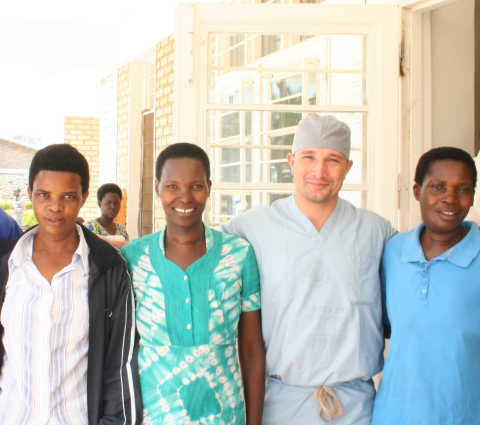
“Seeing the smiles of the community has reaffirmed my calling to medicine,” said Natacha Telusca. “I am grateful to the donors who have supported me, and it has been a pleasure to make a difference in this wonderful community.”
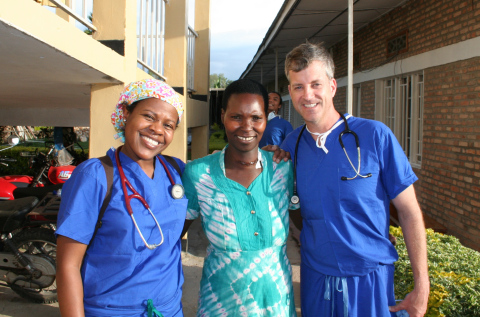
The donors’ substantial gifts, combined with the surgical team’s tireless work, have made the thyroid mission to Rwanda a dependably resounding success. Indeed, the team has been warmly welcomed back time and again by the community at Hôpital Gitwe, returning each year determined to build upon the previous years’ successes.
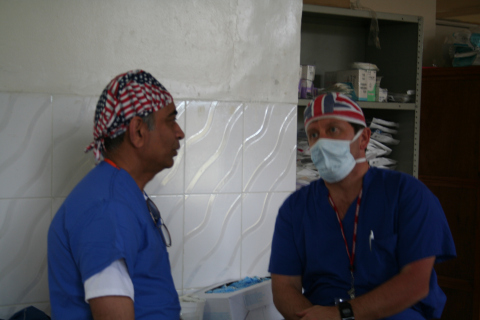
With its skilled team of surgeons, anesthesiologists, and talented young residents, the Gitwe mission has become a remarkable example of the spirit of international goodwill that is the ultimate goal of Medical Missions for Children—a globally meaningful endeavor that patrons of MMFC can feel proud to assist.
Rwandese Hospitality for MMFC Team
March 20, 2014
Wednesday the 19th—day four of surgery—began with the successful excision of the largest goiter of the mission—nearly 700 grams in weight. The surgery was a multi-hour affair and required the assistance and expertise of every surgeon, anesthesiologist, and resident on the MMFC Gitwe team. Despite the long duration of the first case, the surgery team still managed to operate on all scheduled patients, forgoing their lunch breaks in favor of providing the care that was promised.
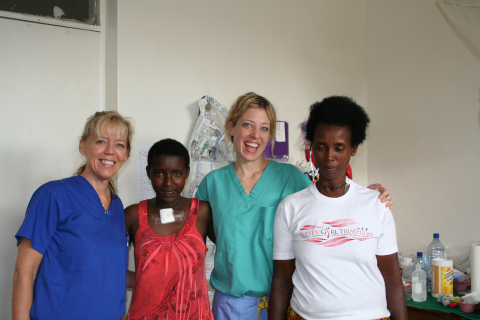
At day’s end, the team was exhausted but in good spirits after continuous sessions in the operating room. For dinner, site host Vianney Ruhumuliza invited the MMFC Gitwe team to his family’s home in the nearby village of Mbuye. Per tradition, the team made the trek by foot. The 90-minute sunset hike from Gitwe to Mbuye began with thick rainclouds overhead, and a brief shower threatened to wash out the team’s hopes of a scenic and relaxing walk in the countryside. However, the weather cleared just in time for sundown, and team was rewarded with a truly remarkable experience: dusk atop a Rwandese ridge, surrounded on all sides by lush valleys dotted with evening fires, the pleasant odor of wood smoke filling the air as the sun descended behind the country’s legendary collines, or hillsides.
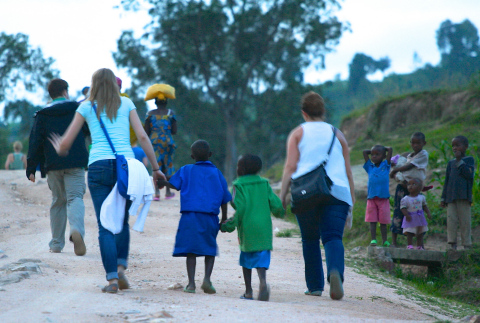
The welcome at the Ruhumuliza residence was expectedly warm and gracious. A large fire had been constructed in the center of a dirt courtyard, flanked by holding pens for farm animals and knee-high benched filled with local children and generations of the Ruhumuliza family. After handshakes and mutual thanks were exchanged, the team was invited to the living room in keeping with Rwandese traditions, meeting with Vianney’s parents and siblings before receiving a customary pre-meal blessing. Served a kingly spread of beef stew, roasted potatoes, whole leg of lamb, broiled cauliflower, and traditional imyumbati—a dish of ground cassava leaves—the team joined the locals and family members in the courtyard to eat, laugh, and share stories of travel.
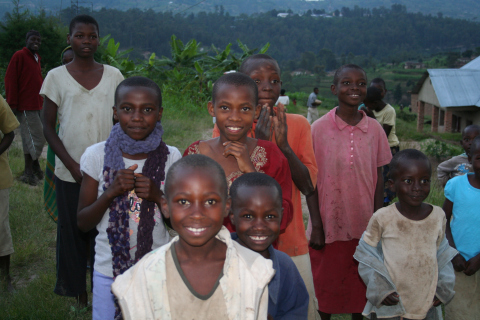
With dinner complete, the local kids lined up in the courtyard for a recital of some of their favorite songs, all in Kinyarwanda. Lit by the smoldering fire, the children’s bright smiles seemed to dance alongside their singing, and there was barely a word from the MMFC team during the performance—only applause and cheers and looks of enraptured appreciation for the children’s incredible gift of authentic Rwandese hospitality.
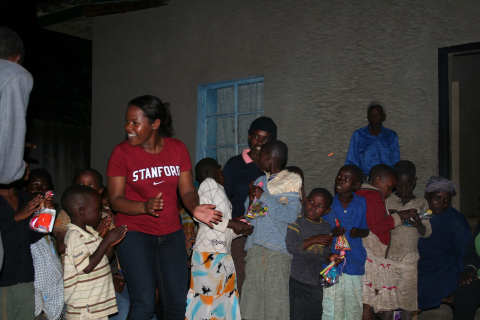
As the performance ended, Vianney’s father, Mr. Mdandi Ruhumuliza, stepped to the center of the courtyard and delivered a final blessing before the team was driven back to their accommodations in Gitwe for a good night’s sleep ahead of the final planned day of surgery. With another five operations slated for Thursday’s schedule, the positive energy gleaned from their experience in Mbuye was an essential restorative for the team after a long week of treating thyroid afflictions at Hôpital Gitwe.
A Letter of Thanks to MMFC Gitwe
March 20, 2014
Lydia is a Ugandan woman from Kabale who received surgery from the MMFC team to excise an apple-sized goiter on the front of her neck. She is a social worker and teacher, earning her B.A. in Eduction from Makerere University in 2011. A mother of two, she made the trek across the Uganda-Rwanda border with her cousin, Musinga, as the driver. Lydia was originally scheduled to be operated on later in the week, but she needed to be back in Uganda before Saturday morning in order to make it back to her job at the Compassion International children’s home. Wanting to accommodate her tight work schedule, the MMFC team made every effort to move her procedure to earlier in the week, and Lydia received her surgery on Monday afternoon. Before departing back for Uganda on Thursday evening, Lydia wrote a tremendous letter of thanks to the MMFC team, the transcript and photos of which can be found below.
Dear Sir,
RE: Appreciation of Good Medical Services
I take this pleasure to appreciate the opportunity rendered to all patients who visit this hospital. I appreciate the Ministry of Health in the Republic of Rwanda for their great work to improve the health of the people not only in Rwanda, but to the neighboring countries.
I am grateful to the work done by the doctors, nurses, and the entire staff. I do appreciate the team of professional doctors that traveled from U.S.A. to operate [on] patients with goiters. I Lydia, from Kabale, Uganda, heard about the team of doctors that were traveling from USA — United States of America — to Gitwe Hospital over the radio, and then we called some people in Rwanda to confirm the announcements, and they said it was true.
I have benefitted personally. I travelled from Uganda to Rwanda on Friday, 14th of March 2014. I was operated on Monday, 17th of March and was discharged on 20th of March 2014, in a very good condition.
I am grateful for all the services done here in Gitwe Hospital, where patients are given food freely, the rooms are very clean. The entire environment is clean, all the staff you meet greet you with a smile, people here are very friendly. We really appreciate the Republic of Rwanda for all that made our visit a success, our words cannot express the way we feel at heart. The free medical services that people receive makes the whole thing amazing. All in all, I am grateful to all. God bless you.
– Lydia
Another Successful Year for MMFC Gitwe
March 21, 2014
With just one surgery scheduled for Friday morning, the MMFC Gitwe team celebrated another year of successful thyroid operations, providing nearly 30 patients afflicted with long-term thyroid conditions with surgical procedures that they might otherwise not have been able to access. In spire of their mood of relief, the surgeons and anesthesiologists maintained an attitude of professional focus, operating on a young girl’s groin to relieve her of discomfort that has prevented her from walking without pain for the duration of her young life. This surgery is just one example of the special cases that the team undertook this week, making room between thyroid-specific cases to operate on needy children with conditions that could otherwise be inoperable without the MMFC team’s help.
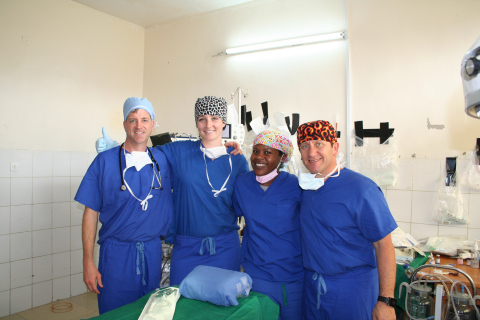
The 2014 mission’s tremendous success is due in no small part to the tireless work of everyone involved, from the donors to the doctors and nurses to the support staff. MMFC’s thyroid team would especially like to thank the nurses and doctors of Hôpital Gitwe for their incredible warmth and invaluable assistance in unfamiliar surroundings: the mission would never have gotten off the ground without their willingness to help in the operating room, the PACU, the recovery room, and everywhere else in between. Their brilliant energy truly inspired the entire team and made each day’s surgeries that much easier to complete, in turn allowing more patients to be screened and assessed—the ultimate goal of the MMFC thyroid mission to Gitwe.
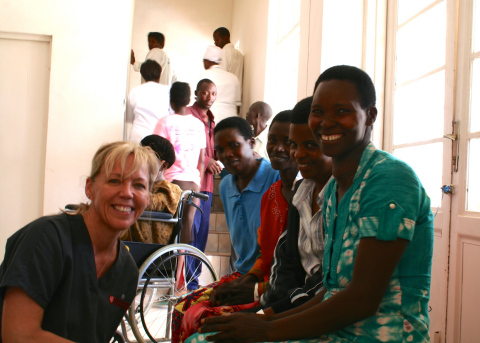
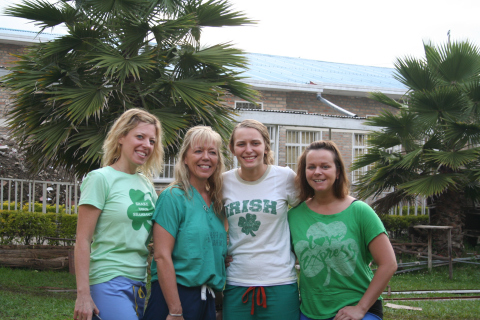
In addition to the efforts of the Hôpital Gitwe team, the MMFC surgical team would also like to recognize the efforts of them team’s nurses. Tanya Lashchuk, Ashley Richards, Shannon O’Keeffe, and Jana Barkman were consistently positive presences in the operating room and the PACU, providing crucial service to the patients that eased their experience of the thyroid procedures. In the OR, Tanya and Ashley were on their feet for more than 10 hours a day, helping to maintain the smooth pace of operations that marked the week’s work in Gitwe. In the PACU, Shannon and Jana were unshakable, managing a dynamic operating schedule, providing essential pre- and post-op care, acting on shifts in patients’ conditions and, most importantly, keeping up patients’ spirits with their gentle, warm attitudes.
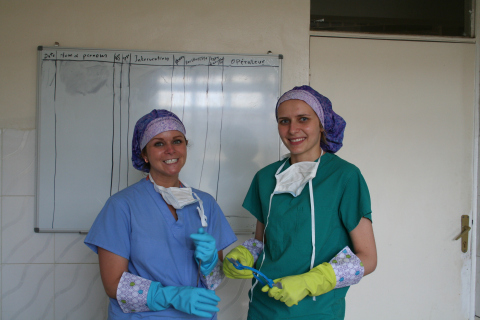
Also of massive help during the week was administrative lead Leslie Collins, who single-handedly tracked the week’s operations, handled all photography responsibilities, controlled the team’s finances, and served as the team’s project manager, ensuring that all equipment and resources were in place and responding to any and all project-based issues that arose during the week. Her gregarious energy was palpable the entire trip, and the whole team came to rely on Leslie not only for her administrative efficiency, but for her unceasing effusiveness that was a critical source of positivity in the face of marathon surgeries performed in the Rwandese heat.
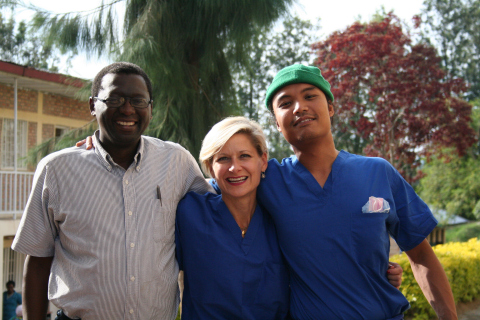
Finally, the writer would like to express his tremendous gratitude to the MMFC team, as well as the Gitwe community. He has been genuinely touched by everything he’s experienced during his week-plus with this team and this community: the doctors’ happily selfless work, the nurses’ unbelievable friendliness, the villagers’ beautiful smiles and profound hospitality. The locals are easily the proudest, kindest people that the writer has been fortunate to encounter in his young life, and the warmth they’ve shown him and his team will not fade in memory or effect. The MMFC’s doctors, residents, and nurses are people to be admired and emulated. Indeed, the lessons learned here are of a weight and importance that cannot, unfortunately, be put into words as of yet. But the writer is confident that, as he processes the immense power of this life-altering trip to Rwanda, he will be able to iterate and more truly understand the complex nature of our world, and more accurately represent the irrefutable significance of compassionate love in his own work as a writer.
Thank you to Leslie, Jeremy, David, Andrew, Jeremiah, Tanya, Ashley, Jag, Jana, Shannon, Geoff, Vianney, Stephanie, Natacha, and Kevin, and especially ALL of the patients and staff at Hôpital Gitwe for teaching me what has already proven to be one of the most important lessons of my life.
Cheers,
Paul Christian Barrera

